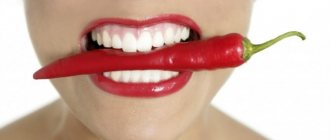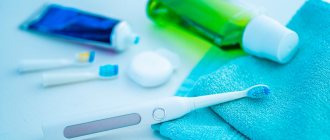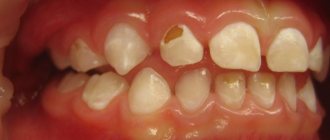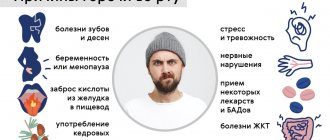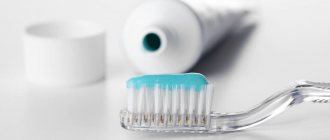How does a bitter taste in the mouth occur?
The taste in your mouth doesn't have to be overtly bitter; it can feel metallic, sour, or just plain unpleasant. Usually its appearance is associated with certain conditions:
- immediately after eating (if you overeat or eat certain foods);
- after taking medications, especially if a person takes them on an empty stomach;
- after physical activity;
- immediately after waking up.
Bitterness is felt as a foreign, strong, unpleasant taste that comes from the oropharynx or has no obvious source. It may be part of a symptom complex. Along with a bitter taste, the following may appear:
- heaviness in the side;
- abdominal pain;
- white coating on the tongue;
- nausea, vomiting;
- heartburn;
- belching;
- dry mouth or, on the contrary, excessive salivation;
- dizziness;
- bloating;
- bleeding gums;
- cold symptoms (sore throat, cough, fever, weakness);
- decreased appetite;
- deterioration of smell and other symptoms.
By exactly when bitterness appears and what other symptoms arise, one can judge the causes of the condition. To make a diagnosis, you need to see a doctor and describe to him in detail how you feel.
Why is the tincture bitter? How to remove bitterness from tincture
It often happens that when preparing homemade tincture recipes, bitterness appears in the final drink. The reasons for this effect may be different. For some drinks this is normal (for example, in the case of tincture of galangal, rowan, cranberry, anise and some other herbs and berries). Almost always, bitterness accompanies tinctures on nut shells, especially if the infusion period was long. However, the appearance of a bitter taste is not always due to the specifics of the raw material. Let's look at the main reasons and methods for getting rid of excessive bitterness.
Why is the tincture bitter?
There may be several reasons for this:
- features of the nature of the ingredients (herbs, nuts and their shells, rich in bitter and tannin substances);
- low quality ingredients (long-stored or old herbs, nuts, dried berries);
- long infusion period (the longer, the more substances pass into alcohol. For example, from berry seeds).
Sometimes the tincture becomes bitter if the quality of the alcohol base is poor (for example, if low-quality moonshine was used). To avoid the influence of this reason, it is best to use a pure, high-quality product obtained using modern equipment (we recommend paying attention to the Luxstahl 8m moonshine still).
How to remove bitterness from tincture
If the result is too much bitterness or there shouldn’t have been any in the drink, you can use the following methods:
- use of special activated carbon brands BAU, KAU. These brands are specialized for the alcoholic beverage industry and help purify alcohol from impurities. However, remember that they will take on not only bitterness, but also other aromatic components. Therefore, the taste of the tincture as a whole will be a little poorer;
- adding juice/tonic. The result is a cocktail version, and do this immediately before consumption. In general, there are several recommendations on how to drink bitters. For example, tomato and citrus juices, as well as some types of other alcohol, go well with bitter and spicy liqueurs;
- softening bitterness with honey or glucose syrup. The sweetness will smooth out the harsh notes, but the main thing in this matter is not to overdo it.
How to remove bitterness from rowan tincture
Rowan itself is bitter, especially if it was collected before the first frost. If you overdosed the drink or added too many berries, you can try to soften the taste with honey, glucose solution or food glycerin. However, it is honey that will fit in as organically as possible. Start with minimal amounts of sweetener in a test volume of the tincture, and only after choosing the desired proportion, add honey to the main volume of the drink.
How to remove bitterness from alcohol tinctures
Any of the methods described above. Sometimes the bitterness is enhanced by the hardness of the alcohol (especially if it is of mediocre quality). In this case, softening will also help (you can use food grade glycerin), but cleaning with charcoal will not help, since a slight release of aldehyde during such cleaning will make the alcohol even more “vigorous”.
Causes of bitter taste in mouth
Bitterness in the mouth can appear due to diseases of the digestive system, teeth and gums, due to changes in hormonal levels, taking certain medications and for other reasons (Fig. 1). At the same time, the accompanying symptoms and conditions under which a person feels a bitter taste in the mouth will be different.
Figure 1. Some causes of bitterness in the mouth. Source: MedPortal
Poor quality food
Foods cooked with a lot of oil, fat or burnt can cause a bitter taste in the mouth. Sometimes the bitter taste is associated with drinking black coffee or very strong tea. It can also appear if a person has eaten sunflower seeds or nuts. The bitterness will go away if you drink cool water, but a slight unpleasant aftertaste may persist for a while. If the bitter taste comes from food, there will be no other symptoms (pain, indigestion).
Age-related changes
With age, a person's taste perception gradually changes. Older people are less able to discern tastes, but may still experience bitterness. This is associated with a number of other health changes, for example, decreased saliva production, dry mucous membranes, and a gradual deterioration in oral health.
Smoking
If a person smokes frequently, they perceive the taste of food less well, and this can increase the bitter taste in the mouth. Also, bitterness in the mouth of smokers may be associated with the taste and smell of tobacco smoke. The resins contained in it linger on the mucous membrane of the oral cavity and settle on the surface of the tooth enamel. This is the cause of bad breath, deteriorating dental health and the associated persistent bitter taste. You can beat it with chewing gum or mints, but it is better to quit smoking or at least reduce the number of cigarettes you smoke.
Pregnancy
In the first trimester, bitterness in the mouth may appear along with other symptoms of toxicosis. It usually worsens with nausea or after vomiting. Fluctuations in estrogen levels can affect the perception of tastes. Cholestasis of pregnancy can also cause bitterness. This is a relatively rare syndrome that develops in the third trimester and is characterized by pruritus and cholestatic jaundice. Cholestasis in pregnancy resolves after childbirth and is considered a relatively harmless condition, but if symptoms appear, you should inform your obstetrician-gynecologist.
Functional dyspepsia
Functional dyspepsia is a disorder in which a person does not have severe diseases of the digestive system, but experiences pain, early satiety and a feeling of fullness after eating, and a burning sensation in the upper abdomen. In this condition, the feeling of bitterness occurs due to slow digestion of food. It may be accompanied by abdominal cramps and other unpleasant sensations. Functional dyspepsia is associated with a number of factors, including stress, smoking, heredity, and recent infectious diseases. You can relieve the bitter taste in your mouth by drinking water with lemon juice. If the condition does not go away or the pain intensifies, diarrhea, vomiting or other severe symptoms appear, you should immediately consult a doctor.
Hepatitis
Bitterness in the mouth is the initial symptom of hepatitis and accompanies liver inflammation. In this case, the bitter taste appears in the morning, immediately after waking up or 30-60 minutes after eating. This is accompanied by heaviness in the right hypochondrium, pain, nausea and vomiting containing bile. With toxic hepatitis, symptoms appear for a short time and disappear after starting treatment. With viral hepatitis, bitterness in the mouth persists almost constantly.
Pathologies of the gastrointestinal tract
If food digestion is impaired, an unpleasant taste appears in the mouth. The sensation of bitterness may occur due to a change in taste perception. It occurs, for example, with pancreatitis and may be accompanied by vomiting and the appearance of a yellow or grayish coating on the tongue. A common cause of bitterness in the mouth is gastroesophageal reflux disease (GERD). In this disease, stomach contents (stomach juice and food particles) regularly back up into the esophagus, causing heartburn and a bitter taste in the mouth (video 1).
Video 1. Symptoms of gastroesophageal reflux disease.
If a person has chronic gastritis or duodenitis, a bitter taste appears when he violates the recommended diet. In diseases of the digestive system, a feeling of bitterness in the mouth is always associated with food intake (appears some time after it).
Biliary system damage
A bitter taste may appear in the mouth due to cholelithiasis, cholecystitis, cholangitis and other diseases of the biliary system (gall bladder and bile ducts). At first, bitterness may appear only after drinking alcohol, fatty or fried foods.
“Burning in the mouth, tongue covered with a yellow coating, discomfort, and so on. In 95% of cases, this is due to the reflux of bile from the duodenum into the stomach. In the stomach, this bile is mixed with hydrochloric acid, thrown into the esophagus and then into the oral cavity.”
Karasev Ivan Alexandrovich
expert
FSBI "N.N. Blokhin National Medical Research Center of Oncology", endoscopist
Without treatment, the condition will gradually worsen. The bitter taste will bother you more often and last longer. Along with it, nausea, pain in the hypochondrium on the right side, and stool disorders may occur. The feeling of bitterness becomes permanent if a severe inflammatory disease of the gallbladder or bile ducts develops (cholangitis, cholecystocholangitis, cholecystitis and others). Also among the possible causes are biliary dyskinesia, due to which the outflow of bile is disrupted, and cholelithiasis. Less commonly, the disorder is associated with parasitic liver disease (giardiasis, opisthorchiasis or echinococcosis).
Dental diseases
The feeling of bitterness can be caused by the presence of tartar, caries, gingivitis or other dental problems. There are usually other symptoms:
- toothache;
- enamel sensitivity (reaction to cold or hot, sweet, sour);
- bleeding gums;
- tooth mobility;
- gums look red or swollen;
- There is a noticeable plaque on the enamel that cannot be removed by regular teeth brushing.
Problems with the health of teeth and gums may be associated with xerostomia, a condition in which insufficient saliva is produced and the mouth constantly feels dry. This increases the risk of tooth decay and gum disease, and causes an unpleasant odor in the mouth, which is perceived as bitter. Xerostomia can occur due to smoking, mouth breathing, aging, diabetes, or autoimmune diseases. This condition requires consultation with a dentist.
Sometimes bitterness in the mouth appears after dental treatment. This may be due to the use of certain medications or materials, or the installation of dentures, braces and other structures in the mouth. If the bitter taste does not go away or persists for several days, you should contact your dentist.
Neurological disorders
The mouth may taste bitter due to damage to the brain structures that process taste information. In this case, taste perception is disrupted: for example, sour foods may seem sweet, salty foods may seem sour, and a person may not perceive some tastes. This can occur after a traumatic brain injury or stroke. Sometimes taste disturbances are associated with Alzheimer's disease and other age-related diseases in which neurodegenerative processes occur.
Complications of pharmacotherapy
There are more than 250 types of medications that can cause taste disturbances, including the appearance of bitterness in the mouth. This can happen if the drug affects the taste buds of the brain, if part of it remains in the saliva and changes its taste, if the drug suppresses the microflora, which is why fungal diseases develop. Among the drugs that can cause a bitter taste in the mouth:
- antibiotics;
- medications for arrhythmia, diuretics, statins and other drugs used for cardiovascular diseases;
- drugs used in chemotherapy;
- muscle relaxants, migraine medications and other neurological drugs;
- neuroleptics, sedatives, hypnotics, antidepressants;
- non-steroidal anti-inflammatory drugs;
- bronchodilators;
- antihistamines;
- antiviral drugs;
- nicotine replacement therapy products.
Rare causes
Sometimes bitterness in the mouth becomes a symptom of endocrine disorders: diabetes mellitus, hypothyroidism, hypocortisolism and others. It can accompany some cancers and respiratory diseases. Rarely, the cause is an infection of the salivary glands. A bitter taste may occur in cases of poisoning due to accidental ingestion of a toxic substance. In all these cases, the appearance of bitterness is accompanied by other symptoms of the underlying disease.
2. Reasons
Even a non-specialist in the vast majority of cases associates a bitter taste in the mouth with a pathological state of the digestive system, more precisely, the liver and/or biliary tract. Indeed, the biochemical and physiological evolution of higher mammals has led to a strange paradox. As you know, bile produced by the liver is absolutely necessary for the digestion of food, be it the simplest food or exquisite delicacies. But at the same time, bile itself has a sharp unpleasant odor and an unbearably bitter taste, so normally it goes directly into the intestines (starting from the duodenum) and does not come into contact with the taste buds of the oral cavity. However, in a number of abnormal or clearly pathological conditions and processes, bile stagnates, is thrown into the stomach and esophagus, its taste is felt in the mouth - in a word, that same bitterness appears. In some cases, this may be associated with the consumption of too fatty foods or simply with banal overeating (the bitterness disappears as the body copes with the overload), in others it serves as one of the diagnostically significant signs of a serious gastroenterological disease. Thus, the most likely groups of causes of bitterness in the mouth are:
- diseases and any congestion in the biliary (bile) system, i.e. all kinds of dyskinesias, anomalies or pathologies of the bile ducts, cholelithiasis, pathology of the gallbladder, etc.;
- liver diseases: hepatitis, oncopathology, cirrhosis, etc.;
- diseases of the gastrointestinal tract with reflux syndrome (reflux into the esophagus): gastritis, gastroduodenitis, cancer of the pancreas and other gastrointestinal organs.
However, the above reasons, with all their diversity and, indeed, the greatest probability, do not exhaust the list of possible sources of bitterness in the mouth. You should also add to it:
- allergic reactions (in particular to dental materials);
- chemical intoxication, incl. taking certain groups of medications with hepatotropic side effects;
- inflammatory processes (especially with a purulent component) in the oral cavity;
- the presence of worms;
- endocrine disorders;
- infections;
- dysbacteriosis;
- hormonal changes associated with gestation (pregnancy) or menopause;
- deficiency or imbalance of a number of microelements necessary for the body (B vitamins, zinc, etc.);
- smoking (the more cigarettes smoked per day, the more stable and intense the bitter taste in the mouth and lips), as well as withdrawal symptoms when quitting smoking, which can be controlled with a special diet and vitamin therapy;
- alcohol consumption;
- abnormal mental states (depression, chronic stress, etc.).
Visit our Gastroenterology page
Help before diagnosis
Even if a diagnosis has not yet been made, several measures can be taken to alleviate the condition:
- Adjust your diet, remove fatty and fried foods, eat more often and in small portions.
- Stop smoking or reduce the number of cigarettes you smoke.
- Limit alcohol consumption.
- Drink more water.
Monitor the quality of oral hygiene. You should brush your teeth twice a day, as well as use mouthwash and floss. If you have problems with your teeth, you need to visit a dentist.
Photo: goffkein/freepik.com
Important!
You should not try to use folk remedies or treat yourself - this can be dangerous. If a bitter taste in your mouth appears regularly, you should consult a doctor and get recommendations for treatment.
Prevention of bitterness in the mouth in adults at home
There is nothing difficult in preventing this unpleasant phenomenon. You just have to follow some rules.
Pay attention to your diet. Avoid foods that increase bile formation.
Say goodbye to bad habits. Almost all heavy smokers live with a bitter taste in the mouth, which will immediately disappear if you give up nicotine. Minimize alcohol consumption - in large doses it leads to liver problems.
A balanced diet, a gentle lifestyle without bad habits will help you avoid many health problems - and discomfort will never appear.
When to see a doctor?
If the appearance of bitterness in the mouth is not associated with drinking coffee, burnt or poor-quality food, if the bitter taste appears regularly or persists for a long time, if it is accompanied by other symptoms, you should consult a doctor. This could be a dentist, if the bitterness in the mouth is associated with diseases of the teeth and gums, a gastroenterologist, if the cause may be diseases of the digestive organs or biliary tract, a hepatologist, if there are symptoms of liver disease.
Important!
In some cases, you need to urgently seek medical help. If bitterness in the mouth is associated with accidental ingestion of poison, if it appears along with other severe symptoms (difficulty breathing, swelling of the tongue, lips, difficulty swallowing, paralysis, changes in consciousness), you should immediately call emergency medical help.
How to reduce bitterness in your mouth
You can get rid of the feeling of bitterness in your mouth only after treating the disease of which it is a symptom. To alleviate the condition, you need to reconsider your diet: do not eat fried, fatty, salty and smoked foods, switch to foods of plant origin. You should avoid stress, take soothing herbal infusions, and exercise.
A feeling of bitterness may occur due to the formation of toxins in the body. Therefore, it is necessary to treat the intestines. Cleansing enemas and taking enterosorbents will help, which not only cleanse the body of toxins, but also relieve constipation and ensure regular bowel movements. To cleanse the body, you need to drink plenty of clean water every day.
Diagnostics
You can start diagnosing with a consultation and examination with a doctor. To do this, you need to contact a therapist, gastroenterologist, hepatologist or dentist. The doctor will conduct a survey and refer the patient for examination.
Photo: okfoto / freepik.com
During the consultation, the doctor needs to describe in detail the existing symptoms, tell how often and under what circumstances bitterness appears. Information about lifestyle, diet, and existing diseases will be useful.
For diagnosis, the following studies are carried out:
- Duodenal sounding. If a malfunction of the biliary tract is suspected, portions of bile are taken using a probe for bacteriological examination, and the rate of excretion of bile into the duodenum is also assessed.
- Gastroscopy (EGDS, FGDS) is a study using a gastroscope. Allows you to examine the mucous membrane of the digestive organs and do a biopsy (take tissue samples for laboratory testing).
- Ultrasound of the liver, gall bladder and other organs. It is carried out to assess the size and presence of changes in internal organs.
- Lab tests. If diseases of the digestive organs or biliary tract are suspected, a stool test is prescribed. A biochemical blood test is performed if cholecystitis is suspected. A test for hCG and sex hormones, as well as a serological test if viral hepatitis is suspected, can also be performed.
Treatment
Treatment is prescribed based on diagnostic results, taking into account the causes of bitterness in the mouth.
Conservative therapy
Photo: freepik.com
A doctor may prescribe the following medications:
- Choleretics and cholekinetics. These are choleretic drugs that are prescribed for cholangitis and cholecystitis.
- Enzymes that stimulate digestion. They can be used not only for diseases of the digestive organs, but also for liver damage (in combination with hepatoprotectors).
- Antispasmodics. They are prescribed if bitterness in the mouth appears along with abdominal pain and is associated with gastritis or other diseases of the digestive system. Antispasmodic drugs relieve pain and relax the smooth muscles of the stomach.
If the appearance of bitterness is associated with viral hepatitis, the doctor will prescribe complex therapy for the underlying disease. In case of parasitic infection, anthelmintic drugs are prescribed. Additionally, it is recommended to follow a diet, frequent, small meals and control the drinking regime.
Surgery
Surgical treatment is carried out for gallstone disease to remove and remove stones - calculi. If the gallstones are small, the ESWL (extracorporeal shock wave lithotripsy) technique is used, crushing the stones with a shock wave. In more severe cases, open or laparoscopic cholecystectomy is prescribed. It is carried out if neither diet nor ultrasound methods improve the condition. A cholecystectomy involves removing the gallbladder.
Stones extracted from the gallbladder. Photo: Alena1919 / Depositphotos
Popular questions and answers
Gastroenterologist Marat Zinnatullin answered our questions about bitterness in the mouth
Is it possible to treat bitterness in the mouth on your own?
Bitterness in the mouth is a sign of a pathological process, most often associated with the gastrointestinal tract. Even if bitterness in the mouth rarely occurs, in any case this is a reason to consult a doctor to find out the causes and prevent serious illnesses. Most often, bitterness occurs due to problems with the gallbladder and bile ducts (GBD). Bitterness is often a symptom of cholelithiasis, hepatitis, and cirrhosis of the liver. Another group of diseases associated with a bitter taste may be diseases of the esophagus, stomach, and intestines.
When to see a doctor if you have a bitter taste in your mouth?
The bitterness can be reduced somewhat if you add flax seeds, honey, barberry, chamomile decoction, and valerian to your diet. But this will not eliminate the causes of bitterness, so a trip to the doctor is mandatory.
